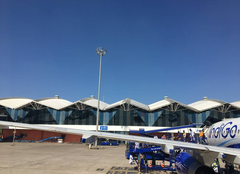Indore Junction Railway Station Visiting Hours, Tickets, and Travel Guide
Date: 14/06/2025
Introduction
Indore Junction Railway Station, situated at the heart of Indore, Madhya Pradesh, is a remarkable blend of historical legacy and modern infrastructure. Established in the late 19th century through the vision of Maharajah Holkar, the station has evolved from a pioneering rail link—overcoming formidable geographical challenges—into a major multi-modal transport hub. With ongoing redevelopment, including a seven-story airport-inspired complex and future metro connectivity, Indore Junction is both a testament to engineering excellence and a vital gateway to Central India. This detailed guide covers the station’s history, architectural evolution, visitor information, ticketing, accessibility, and the best ways to explore nearby cultural attractions (Indore Junction Railway Station: History, Visiting Hours, Tickets, and Nearby Attractions, Indore Junction Visiting Hours, Tickets & Guide to Indore’s Historical Sites).
Contents
- Introduction
- Historical Development
- Holkar State Railway Initiative
- Engineering Challenges and Innovations
- Architectural Evolution and Modernization
- From Early 20th Century to the Present
- 21st Century Redevelopment: Key Features
- Visitor Information
- Visiting Hours and Ticketing
- Accessibility
- Travel Tips
- Nearby Attractions
- Events and Photography
- Indore Junction’s Role in the Rail Network
- Engineering and Architectural Highlights
- Frequently Asked Questions (FAQ)
- Conclusion
- Sources and Further Reading
Historical Development
Holkar State Railway Initiative
The station’s origins trace back to 1870 when Maharajah Holkar financed the rail link connecting Indore to the Great Indian Peninsula (G.I.P.) Railway, enabling the city’s integration into the national network. The Holkar State Railway, built between Khandwa and Indore, traversed challenging terrain and positioned Indore as a strategic junction (indore.city).
Engineering Challenges and Innovations
Overcoming the rugged topography and the Narmada River required impressive engineering:
- Tunnels: Four tunnels (510 yards/466 meters) through hilly terrain allowed manageable gradients for steam engines.
- Deep Cuttings & Retaining Walls: Stabilized the rail route.
- Narmada River Bridge: Featured 14 spans of 197 feet each, with piers up to 80 feet high, designed to withstand floods and heavy traffic.
- Additional Bridges: Fourteen others with piers up to 152 feet high, reflecting the scale of the project.
These efforts set new benchmarks for regional railway engineering.
Architectural Evolution and Modernization
Early 20th Century to the Present
The original station, with its high ceilings, wide platforms, and robust masonry, was designed to accommodate both meter and broad-gauge trains. Over time, expansions addressed growing passenger and freight demands, reinforcing Indore’s status as a central rail hub (indore.city, tripclap.com).
21st Century Redevelopment: Key Features
A major redevelopment project, initiated in 2024, will transform the station by 2027 into a seven-story, airport-style complex (knocksense.com, ssmb.in, freepressjournal.in):
- Scale: Expanding to 4.56 lakh sq ft (42,400 sq m), ten times larger than the current facility.
- Vertical Design: Seven stories with a concourse above four platforms, integrating retail and passenger amenities.
- Accessibility: 26 lifts, 17 escalators, and dedicated features for people with disabilities.
- Modern Amenities: Royal entrance, executive lounge, roof plaza, retail spaces, advanced drainage, and full Wi-Fi coverage.
- Metro Integration: Directly connected to the upcoming Indore Metro for seamless multimodal transit.
- Sustainability: Energy-efficient design to meet long-term urban needs.
Visitor Information
Visiting Hours and Ticketing
- Station Hours: Open 24/7 for passenger and freight services.
- Ticket Counters: Generally operate from 6:00 AM to 10:00 PM.
- Ticket Purchase: Available at counters, automated machines, and online via Indian Railways and mobile apps.
- Ticket Types: General, sleeper, and AC classes. Advance booking is recommended, especially during peak seasons.
Accessibility
The station is steadily enhancing accessibility, with ramps, tactile flooring, elevators, and escalators. Reserved parking and help desks support differently-abled passengers. The forthcoming redevelopment will further elevate accessibility standards.
Travel Tips
- Best Times: Early mornings or late evenings are less crowded.
- Peak Hours: 7:00–10:00 AM and 5:00–8:00 PM.
- Safety: Keep belongings secure and observe platform markings.
- Multimodal Connectivity: Use city buses, BRTS, auto-rickshaws, cabs, and, soon, the Metro for convenient travel (erail.in, mumbaiorbit.in).
Nearby Attractions
- Rajwada Palace: ~3 km; Maratha heritage site.
- Lal Bagh Palace: ~4 km; European-style palace and gardens.
- Kanch Mandir: Unique Jain glass temple, ~2.5 km.
- Sarafa Bazaar & Chappan Dukan: Night food markets, ~3 km.
All are easily accessible by local transport.
Events and Photography
The station periodically hosts exhibitions and cultural events. Photography is encouraged, especially of historic structures like the Narmada Bridge and Mhow Ghat tunnels.
Indore Junction’s Role in the Rail Network
Regional and National Importance
Indore Junction is a vital node linking Mumbai, Delhi, Ahmedabad, Pune, and other major cities. Its dual-gauge history and shift to broad gauge mirror the evolution of the Indian Railways (hectindia.com).
Urban and Cultural Impact
The station has fueled Indore’s commercial growth, tourism, and urban development, making it a vibrant center for both locals and visitors (indore.city).
Engineering and Architectural Highlights
- Narmada River Bridge: 14 spans, 197 feet each (total 2,758 feet/840 meters), piers up to 80 feet high.
- Mhow Ghat Tunnels: 510 yards (466 meters) enabling a manageable climb through challenging terrain.
- New Complex (2027): Seven stories, 26 lifts, 17 escalators, retail, lounges, and direct metro access (knocksense.com).
Frequently Asked Questions (FAQ)
Q: What are Indore Junction’s visiting hours?
A: The station is open 24/7; ticket counters typically run from 6:00 AM to 10:00 PM.
Q: How can I book train tickets?
A: Purchase at counters, vending machines, or online via Indian Railways or official apps.
Q: Is Indore Junction accessible for wheelchair users?
A: Yes. There are ramps, elevators, and dedicated assistance, with more improvements coming.
Q: What are the best times to visit?
A: Early mornings and late evenings are least crowded.
Q: Are there guided tours or special events at the station?
A: Occasional cultural events are held; check locally for current listings.
Conclusion
Indore Junction is more than a transit point—it is a living symbol of historic vision, engineering prowess, and urban progress. From its 19th-century origins to a cutting-edge transit hub, the station remains central to Indore’s connectivity and cultural vitality. Whether you visit for travel, heritage exploration, or business, understanding the station’s story and practical details will enrich your experience.
Visuals and Media Suggestions
- High-resolution images of the heritage building and platforms
- Historical photos of the Narmada River Bridge and tunnels
- Renderings of the new seven-story station complex
- Maps showing station location and nearby attractions
Internal Links Suggestions
- Guides on Rajwada Palace, Lal Bagh Palace
- Tips for Indian Railways ticket booking
- Updates on Indore Metro and urban transport
Sources and Further Reading
- Indore Junction Railway Station: History, Visiting Hours, Tickets, and Nearby Attractions
- Indore Junction Visiting Hours, Tickets & Guide to Indore’s Historical Sites
- Plans Unveiled for Indore’s Grand Seven-Story Railway Station
- Indore New Railway Station Building to be 7 Storied, 10 Times Bigger
- Indore BG Railway Station – Facilities, Connections, and Timings
- Indore Multi-Modal Integration Plan for Metro Stations
- Rajwada Palace – Official Indore Tourism
- Rajwada Palace Virtual Tour
- Indore Historical Sites Guide
- Indian Railways Official Site

